Text
A Rather Dull Announcement!
One of the oldest and most unique features of Complice, going all the way back to the beginning, is the way each goal gets its own color. This produces a vivid sense of where your time is going, just by glancing at the list. And I've seen people use those goal colors with everything from sticky notes to gmail labels to Philips Hue lights.
This isn't surprising, given that it was made by me, Malcolm Ocean. I'm known for being a very colorful guy! And in fact, for the first year of Complice, the only colors you could choose from were 10 different neon hues 😅 Then a friend of mine was signing up and said "I hate all these colors" and pointed at what the colorpickers look like in videogames for customizing armour and so on...
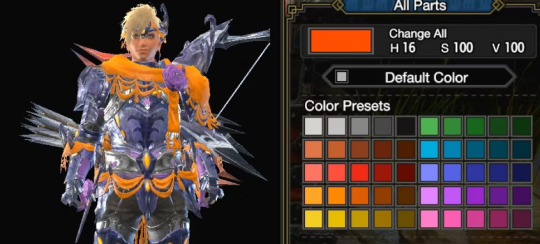
...and I was like "oh, I can do that" and added some darks and some greys. But a lot of the main colors remained rather neon, albeit with 20 hues, not just 10.
Well, after growing up a bit, and nearly a year of experimentation, I've discerned that the garish neon colors are a bit much. I added a little switch to desaturate all my goals at once, and after playing with it briefly, I realized I like it a lot, and now when I turn the switch off I'm like ow, my eyes 😳. It's a bit much!

And thus I've decided to share this joy with all of you, and desaturate the entirety of Complice.
So when you log on to Complice today, you'll find the colors much less accosting to the eye than they were before:
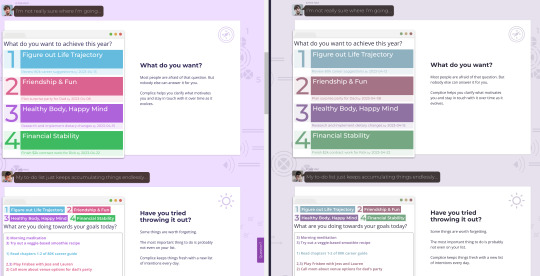
3 notes
·
View notes
Text
Wanna set aside some time to be intentional about your upcoming months/year(s)/life?
We've got more sessions of our GCI workshops coming up in December & January! Join us online for:
📺📄 high-quality content (videos+exercises)
🍅👥 structured co-working on goal-setting & planning
💬💡 live coaching—uncover blindspots
"Feels like the most useful chat I ever had in my life."
— Artyom, a participant
0 notes
Text
Complice NOW with even less staleness
The Complice app is famously designed to avoid one of the major problems that plagues productivity systems: staleness. Staleness is when a list gets full of items that are no longer priorities or perhaps no longer useful at all, and it's a common reason people give up on a system (implicitly or explicitly).
The main way Complice has avoided staleness so far is by keeping your list focused just on today. You can't put in a bunch of stuff days or weeks in advance, and if you didn't do something yesterday, Complice doesn't assume that it should hang over you today.
...but what if today's list goes stale midday through the day? Sometimes I set a bunch of intentions last night and when I look at them today I'm just like "ugh I don't want to do any of that."
Introducing: the Now Page. It's the Today Page of the Today Page. It always starts blank, even if you've already set intentions for the day, and just asks "What now?" You choose something to work on, by typing in an intention or picking one from various lists, and then it shows you that.
At first glance, this may strike you as essentially equivalent to the Next Action view or the New Tab Page extension. There's one key difference from those though: when you mark your Now intention complete (or "not now/today") it doesn't automatically show you the next item on the list. It goes back to the expansive, open-ended "What now?"
If you just want to grab the next item from your list though, that's easy to do, just ctrl+click on the list icon and you'll automatically get the next item from the list. If you ctrl+shift+click, you'll get a random item from the list! You can do this with the existing intentions list, or the notdones list, and potentially other future lists.
The fact that it integrates with the existing intentions list means you can use the Now Page in parallel to the Today Page. You might set a list of intentions on the Today Page in the evening, then open the Now Page the next morning to decide what to do freshly. However, you can also use the Now Page exclusively, bypassing the Today Page altogether. This is a first for Complice—having a totally different primary workflow, that still integrates with outcomes, reviews, etc. I have the sense that more workflows are on the way.
So, if you're ready, click here to check it out: Now Page
0 notes
Text
some advice to a Complice user feeling discouraged
First I want to say that I really support you honoring the movements of your energy and not try to get more done than you have the capacity to do at a given time. I figure that probably would just make the downswings even worse.
It sounds like maybe the thing to do is to find if there's a way that would feel good to refactor your goals. I've been wanting to build systems into Complice that would walk people through various refactoring processes. One thing that sometimes is helpful for me on this front is to sort of back up and ask myself "what are all the little things I'm trying to cause to happen?" and just write them down, on paper or my phone or a doc. And then they kind of naturally cluster into something that's usually pretty similar to my existing goals but sometimes usefully different.
Sometimes it does serve a goal but that wasn't the point of doing it.
I'd say it's an issue if you're *only* doing these, or rather if you're only doing things that are tangentially relevant to a goal but don't move the needle, eg reading a bunch of books about making music but not actually making any music. But otherwise I think that noticing things that serve your goals even if you got drawn into doing them for other reasons is actually very much part of Complice!
If without reviews your goals are getting stale, I'm guessing you might have goals & plans too tightly coupled or something. Because if you're aiming at a multimonth goal, while it'll evolve a bit as you do more things and learn more about what you really want, it shouldn't build up too much staleness in my experience unless you've been making a bunch of assumptions about *how* you're going to do it.
You could try shortening the reviews—reduce each of them to one question or something like that. (idk if you know but you can customize the reviews questions, right in the reviews or on the goals page)
I'm experimenting with not presetting intentions, and not having intentions feed into larger structures of goals, and unsure how to represent this in the complice ontology.
The first one is very compatible with Complice—it's something I recommend people do if they're feeling averse to any sort of planning process but still want to be intentional. The second... hm. Okay, well, when I combine this with a sense of you wanting to refactor your goals, one idea that comes to mind is to just completely change the level of abstraction of your goals, so they're not about specific projects they're just about something like "peace of mind", "flow states", "meaningful learning" or something like that.
Also I notice you have 10 goals right now—might be easier to manage a bunch of what you're doing if you had fewer. You can assign intentions to archived/completed goals by using the 2-letter code for the goal:
CL) something towards CL goal
That might make it easier to archive some of these goals if you know you can still tag things towards those goals. Currently it only works in intentions but I want to add that to outcomes too. Maybe I'll do that right now!
[update! I did kind of do it: if you shift+click the button to add a misc item in outcomes, it’ll prompt you to set it for an archived goal instead]
1 note
·
View note
Text
How are goals magic? 🧙
By popular demand, we're running a few more Goal-Crafting Intensives coming up for the middle of the year—join us June 27th or 28th.
Some people find the concept of goals a bit passé, sort of like 1980s Management by Objectives, but there are lots of other ways to think about goals. Here's one that I've been exploring lately. (This writing is adapted from a tweetstorm I did a couple weeks ago, where I'm thinking out loud a bit.)
Goals are... kind of like ritual magic.
Basically by naming & enumerating the main careabouts I'm moving towards, I create affordances for invoking them as sources of motivation & clarity.
So let's talk about naming goals.
A friend of mine, Lulie, recently signed up for Complice, and she sent me this message a few days in:
I notice something in me is still not wholly satisfied with the word ‘goal’. I get it more now, and it works as a placeholder, but I’m trying to find a word that’s more... nebulous?
I want a word that can include things like “thing I consider important to do regularly but never reach a particular state”, or “research programme” (where I don’t know the result), or “life-enriching thing I don’t think about whether I’ll do it tomorrow but will do it now”
Maybe Complice ‘reclaims’ the word goal because it’s so present-oriented, so a lot of my gripes with goals aren’t present in its implementation
I sent Lulie this definition of goals as one way to think about it, but I realized it was still missing something huge that I can illustrate by talking about how I relate to my own goals.
A goal is a recognizable desired state in the future, that causes you to act differently in the present so as to realize it.
Then Lulie and I were talking about the idea of her interviewing me about Complice's design & philosophy, I thought "oh man, that would totally connect with my InterView goal" and then I'm like "huh, "InterView" doesn't really *sound* like a goal"
In particular, if you just saw the text "InterView", it probably wouldn't occur to you that that was the name of someone's personal goal. It probably looks more like a company or a software module.
It doesn't express the end state like "debt free" or "release an album".
Yet I feel super clear internally what it's about, and have found it really motivating! So the name here is taking on some other role... 🤔
Something like reifying this thing I care about, so I can invoke it by its name in service of motivation! Sounds almost chaos-magicky 🧙
Let's take some other examples. Here are some other real goal names I've had that are quite evocative:
Habit-hacking (kinda meta & nice alliteration)
Tiger (a fitness goal)
Global Network (twitter, bay area friends etc)
Spinal Grace (towardsness re "posture")
Grok in Fullness (reading, notetaking, BASB, etc)
These goals may have had future targets associated with them, but I'm seeing that they actually also contained a present sense of how I want to relate to those areas of my life.
Talking with Lulie & looking at the Complice goals/howto page, which is the first thing you see after you make an account, and it guides you to set your first goal, I'm seeing how inadequately that page expresses the power of... this thing that I'm currently calling "goals".
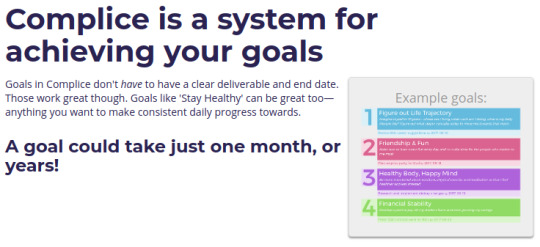
Today I started working on adding the definition to the page ("recognizable desired state in the future, that causes you to act differently in the present so as to realize it") But I'm realizing now that this is still not RELATIONAL enough. Same as a recent lens I'd found for why complice.co has "intentions" instead of "to-dos":
A "to-do" or a "task" is a thing, that supposedly exists external to you. Disconnected.
An "intention" is a relationship you have, with your own future. It's internal, embodied.
So it seems I'm currently in the process of doing foundation-layer metaphor design for Complice, and realizing that "goal" isn't an adequate metaphor in the same way that "todo" isn't.
I thought about a lot of ideas, from "purpose" to "project", to technical neuroscience terms that describe what's going on cybernetically in the brain.
I was thinking about goals in contrast to values, which is something Joe Edelman talks about. Initially I was thinking about goals as being "whats", compared to values as "hows", ie "what I want to achieve" vs "how I want to live my life". But then I noticed that the "what" relationship is only when you're setting the goal. When you're using the goal as a north star while choosing which actions to take today, the goal is less of a "what" and more of a "why"!
The homepage says "Progress towards what matters" & "Complice is for making meaningful progress every day."
I think the first thing Complice needs to ask is not "what are your goals?" but "what matters to you?"
So I redesigned that onboarding goal-setting page to talk a bit more about goals as "whys":
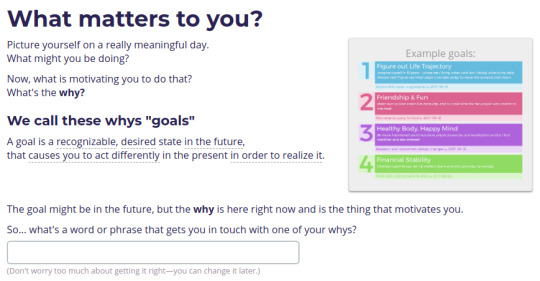
At the top I said "let's talk about naming goals" and turns out that had 2 meanings!
what to name your personal goals
what to name the concept of "goals" itself
And I think "whys" is closest. This redesign of the goals onboarding page applies whys to both of those meanings!
It'll be a bit more work to overhaul the concept of goal in the entire Complice codebase, or to rename the "Goal-Crafting Intensive", so for now at least those are mostly going to stay as they are, but hopefully if you've read this far you have some sense of how fluidly goals can be used to motivate strategic action.
(You can also of course have goals with targets and deadlines, but the point I'm making here is that the magic of goals isn't limited just to that!)
More questions? Want to talk about your specific situation?
Sign up for our online workshop on June 27th or 28th, and get a chat channel to work directly with me & 8 or so other coaches. We can help you with anything mentioned in this email, or talk with you about any other personal life situation that you want guidance on.
One participant said "feels like the most useful chat I ever had in my life."
Learn More & Sign Up
0 notes
Text
What happens if you remove key ingredients from a goal?
We've got a few more Goal-Crafting Intensives coming up on leap-day weekend—Feb 29th and March 1st. There’s recently been some discussion about whether instead of goals you should have systems, or values, or something else. We think systems & values are also great (and we’ve got lots of stuff on that in the GCI) and, as the title suggests, we also like goals.
Here’s the broad & powerful definition that we use for these online workshops:
A goal is a recognizable desired state in the future, that causes you to act differently in the present so as to realize it.
Inspired by a story of someone experimenting with modifying a cookie recipe and seeing what happens, I asked myself "what happens if you pull out each of the key ingredients of a goal? what do you get instead?" Here's the list I came up with:
If...
🛣️ no recognizable state = "trajectory"
😣 not desired = "should"
👀 not future = "regret"
☁️ no action = "dream"
🤠 actions just for show = "signalling"
Let's break those down:
🛣️ Trajectory (no recognizable state)
This one is kind of odd to start with, because moreso than the others, it doesn't necessarily lead to wasted effort. In fact, if you want to explore, whether a new city or a new industry, simply following your appetite can be lovely!
However, consider a vague state like "successful business". If you haven't clarified whether that's measured in $, impact, or personal autonomy, it'll be hard to recognize if you're going off-track from what you really care about.
Many models of motivation, from organizational to neurological, require a comparison between "what is so" & "what is wanted". The want can be implicit, but it often works better when explicit—as long as you don't get fixated on the explication and forget to keep checking in with what you actually want. Speaking of which...
😣 Should (not desired)
This is classic. A lot of the stuff most people have on their to-do lists is not something they feel any sense of motivation towards. It's more like "I don't want to NOT have done this" (which would mean failing my classes, being fired, paying fees)
Even with something like "doing my taxes" though, it's possible to have an orientation that's like "well, given that I will eventually do my taxes, how can I orient towards wanting the spaciousness I know I'll feel when they're done?"
Sometimes though, if you reflect on it, you might conclude: this isn't what *I* want, it's what my parents wanted for me. I don't have to do this, and *I'm not gonna.* This could be as small as sending an email or as large as a career change.
👀 Regret (not future)
On one level, obviously "the future" is the only time you can achieve a goal, but peoples' thinking often involves a lot of stressing about the present already being the way that it is, rather than accepting the present and saying "where to from here?"
Common example: fitness goals. Setting a weight goal causes someone to pay more attention to their body, which activates shame and a feeling of "I should already be thinner/stronger!" Hard to stay in touch with the future & the learning process.
What I've said about regret here has mostly been at a very high-level; there's also a mindset-shift available here that is a worthwhile deep-dive as well. See
this post on transcending regrets
, which we also have an optional exercise on in the GCI workshop.
☁️ Dream (no action)
We defined a goal as something that causes you to take action. This is a way to highlight that a lot of people have "goals" that are sort of floating around not actually motivating them to do anything.
"Feeling bad about not doing it" doesn't count ;)
Classic examples are "learn a language or musical instrument" or " Often dreams are bottlenecked on a decision:
which language or instrument?
how to get started?
when to practice?
You might be conflicted or have fears about your goals, in a way that makes it hard to act on them directly. However, they're still goals (not dreams) if you're taking the best action available towards resolving that internal conflict!
🤠 Signalling (actions just for show)
However, sometimes you might be taking actions, but any reasonable assessment shows that those actions aren't ever going to really move the needle on the goal. Might just be poor strategy, but if you know useful actions but don't do them...
Signalling occurs when someone wants to "be an author" more than they want to actually write, publish, etc. They buy notebooks, spend time in cafés with a blank page open, & talk a lot about writing—all of which are actions, but... 🤨
Signalling usually is related to the other failure modes above:
trajectory: actions aren't going anywhere because no "where" to go
should: "if I stop trying, people will judge"
regret: trying to show you care about past mistake
As a reminder, here's the definition again:
A goal is a recognizable desired state in the future, that causes you to act differently in the present so as to realize it.
It's also worth pointing out a few ingredients that (from my perspective) aren't vital for goals. They might help in some circumstances, but you don't need them. Those are:
a due date (usually embarrassingly over-optimistic)
a numerical metric (which is just a proxy for what really matters)
a state of finality (it has to be in the future, but it can be ongoing)
Anyway, that's the list of ingredients. The recipe, which is the core of the Goal-Crafting Intensive content, is a series of four big steps:
Goal-setting
Planning
Execution
Reflection
Each of these has 3 sub-steps, and for each workshop participant we figure out where they're bottlenecked and then focus on what they can do to create more movement in their life.
More questions? Want to talk about your specific situation?
Sign up for our online workshop on Feb 29 or Mar 1, and get a chat channel to work directly with me & 8-10 other coaches. We can help you with anything mentioned in this email, or talk with you about any other situation that you want more perspectives on.
Learn more and sign up here
2 notes
·
View notes
Text
Benefits to Complice over Evernote etc
A new user writes:
I use evernote for lists, and for planning my week. What do you think the additional benefit would be to adding goal-based tasks with complice? What are the must-dos for complice to get the most out of it? Thanks!
There are a few potential benefits, one of them being that Complice's daily outcomes review may more clearly help you make sure that you're actually working towards all of your long-term goals, and not just 1 or 2 of them.
Another is that many people find that GTD systems that involve collecting lots of items on lists often end up with a bunch of random things on the lists that aren't that important, but require a lot of managing, and mostly don't happen anyway. If you're not having this issue, congrats!
A third could be things like the integration with accountability partners, coworking rooms, etc.
As for must-dos, the most important thing I would say *is* that outcomes submission process. When Complice started, there was no site, just 2 emails a day asking for intentions & outcomes, and ultimately it's the outcomes that are the keystone of it all, because they allow you to see clearly which goals you're moving towards and which need more attention. And then some days it may also make sense to set intentions, or to use the pomodoro timer, and then maybe it also makes sense to do the weekly/monthly reviews, where again for each goal you look at what you did that week/month and consider if you're on track and what else you need to focus on.
A weekly review oriented to "how did I work this week and what's most important towards this goal?" is very different from a weekly review that's trying to organize a huge pile of tasks and prioritize between them, without deep consideration for "what am I actually trying to accomplish with all of this energy?" If what matters most to you is staying on top of lists and not missing deadlines, then such an approach may suit your lifestyle better than Complice! If what matters most to you is that a year from now you've made concrete progress on a few things (even if that means a couple of deadlines or tasks slipped) then Complice is probably a better fit.
I do also think it's worth giving Complice a serious try for a few weeks; even if you don't stick with it, many people find that the experience helps them redesign their personal system.
0 notes
Text
Pareto Improvisation
A simple technique to boost sanity.
You know how sometimes you're "working", but you're not doing important work, maybe just tweaking the formatting on something nobody will ever see?
Or alternatively, you're watching some youtube videos, but you are theoretically in the middle of a pomodoro, so you're trying not to notice that you're watching youtube videos, which means you're also not noticing that the youtube videos you're watching are some random interviews with actors you don't care about, as opposed to the new extended music video from your favorite artist that you're super excited to watch full-screen and engagedly?
I speak from personal experience here, and I tend to feel kind of crazy when I've found myself in this sort of weird compromise, because no part of me is happy with what I'm doing.
Well, I have a really straightforward technique that helps achieve a bare minimum of sanity. It's loosely based on the concept of a "pareto improvement". A pareto improvement is an improvement that improves something along one dimesion while not making it worse along any other dimensions. So it's an improvement that comes without any trade-offs or compromises.
An example could be if one person wants to go to an Italian restaurant and one person wants to go to a Japanese restaurant, and it turns out there's an Italian-Japanese fusion restaurant that both people feel totally satisfied with! Another food example might be if I've got more berries than I can possibly eat before they'll go bad (this is quite a lot) I would be able to share some with you without having any less for myself since I'm already at capacity.
The way you can apply this to your own choices of what to spend your time doing is to seriously take on this stance, which I call Pareto Improvisation:
If I'm doing some thing X, and *all of me* agrees there's something I'd rather be doing than X, then do that instead.
This functions as an alternative to the kind of maxim some people try to give themselves of "do the most important thing". I've tried that, and it has some interesting results but a bunch of unwanted side effects:
It leads to second-guessing myself about what the most important thing is.
It leads to self-deception because I can only do something if I convince myself it's the most important thing.
It leads to rebellion because parts of me don't want to do the most important thing—they want to watch youtube.
With Pareto Improvisation, you don't need to second-guess yourself, because if even one part of you is like "I want to do this more than anything else" then fine! Do it. You also don't need to deceive yourself.
And finally, it lets you honor all of your different desires, and not let them fight each other.
Pareto Improvisation doesn't say "don't do this distracting internet thing", it says "if you're going to do it, you might as well do the most interesting version of it". It allows your internal sense-making to navigate towards better options, without a need to figure out which option is best.
And you might sometimes find that you're on reddit, and none of you particularly wants to be on reddit. You'd actually rather take a nap, or go for a walk, or even do some work, now that you've thought about it.
Seeking internal agreement is a great way to build an internal sense of same-sidedness, which means less resistance whatever you're doing.
I like that it's called "improvisation", because it's very much based on the idea that whatever your plans are, there are always going to be unexpected factors that will require you to improvise (i.e. make something up on the spot).
By the way! We’re soon going to run a few more sessions of the Goal-Crafting Intensive. So if you think your year could be improved by taking 5 hours to set some goals and design some systems, then come join us on February 23th or 24th, and we'll introduce you to other techniques like this or help you design your own techniques to structure your life.
Click here to learn more and sign up
10 notes
·
View notes
Text
Tips on how to navigate a changing day
I wanted to publish this exchange with a Complice user that explores how to think about what happens when what you set out to do something for a day but then something else gets in the way.
The user, OneBigOh, writes:
Hey guys, I wonder if you have any tips on this. I find it really hard to decide on intentions for one whole day. What usually ends up happening is I start with an intention, but later on in the day realize I need to finish something else to be able to work on this intention. And then the day ends up being about things I need to do to be able to start working on the intention as opposed to actually working on the intention. Perhaps the answer is that there's nothing wrong with it, and this is the way it is. But maybe I can improve things a bit by tweaking something.
I asked:
Hmm... interesting. What sort of domain is this? Writing? Business administration? Schoolwork? Or is it happening among all of your different goals?
OneBigOh replied:
Research/software development. Recent example: I wanted to build a specific machine learning model in R, which I had experimented with some time ago on my macbook. But I wanted to work on it in my office on a new linux machine. So I wrote as my intention "build model in R". But then realized I needed to install an R library first. Usually installing things is fairly easy, but my work has the most annoying security rules + they usually give us outdated systems to work with. Turned out, I needed to upgrade the C++ version first on my machine and the version required wasn't readily available for the linux version that was installed. And so on.
Another example: intention is to read a specific paper. Once I start reading it I realize I need to read something else to build some background.
Happens when writing software too. Say my intention is to write a class that can read text from a file and do something with it. When writing that intention I assume that reading text from a file should be trivial. But turns out the library I am using for reading files has bugs in it. Or the specific format I need to read isn't supported. Or something like that. The point is that it's difficult to predict all the obstacles that might come up in the process of finishing something.
And I answered:
One option is just to count progress on installing R as progress on building the model in R, in the same way that buying groceries is progress towards cooking a recipe. But I can see how that ends up a bit weird if you get to the end of the day and you haven't actually worked on the model at all, let alone finished it. I find pomodoros helpful for this, as I can assign 3 pomodoros to a task that ends up not actually complete, but I can still see I've made progress. I also sometimes just add parentheticals to my intentions/outcomes, so it would become:
3) build model in R (spent all day installing R library)
Another option might be to describe your intentions at a slightly higher level of abstraction?
So instead of:
2) read paper X
maybe
2) investigate topic Y: paper X
and then if you realize you need more background reading, you could add a new intention:
2) investigate topic Y: background reading Z
The important thing is that you're setting intentions for what to do that are in line with your goals, and that the intentions are sufficiently concrete that you know how to take action on them.
Here are some more general tips on how to set good intentions, to maximize actionableness, attractiveness, and organization.
0 notes
Text
You don’t have time to not do a weekly review
When it comes to productivity routines, I suspect the weekly review is at the very top of the list of "things people intend to do but don't actually do".
Which is understandable! People naturally put off doing strategic things because they have a sense of there being so many tasks to do.
But the reality is, if you have 100 hours of things on your plate for this week, you're not going to get them all done anyway, which means that somehow things are gonna get cut. Deciding what to cut up front, in a weekly review, has a few advantages:
making better decisions, by deciding consciously and not under pressure
gaining more perspective, by seeing how the tasks you're planning to work on connect with a larger strategy
being less stressed, because you aren't starting your week attempting to do the impossible
If you don't have time to do a weekly review, you don't have time to not do a weekly review.
Now I understand this stuff, and have for years, and guess what? It's still very easy for me to miss doing my reviews consistently. Which brings me to the announcements in this post.
I've upgraded the Complice app to address a few different of reasons why you might not do your weekly review.
You forget. Now there's a red icon in the navbar, and a button next to your intention-setting box, to make it easy to remember that you've got a review to complete.
You get distracted. Now the reviews editor works perfectly offline, so you can do it from your phone on the subway or just go offline at a café. Like the today page, it'll sync when you go back online, even if you close the page.
The questions feel irrelevant. The review questions have been customizeable for awhile, but you had to go to the goals page to do it. Now when you just change the questions in the boxes, they automatically offer to save for next time.
There are also a few other improvements, like better integration of the Top Priorities into the Reviews, and some more formatting hotkeys for inserting blockquotes or lists into the Reviews.
If you want to try this out, sign into Complice here.
Or keep reading for some screenshots, first of the reminder buttons:

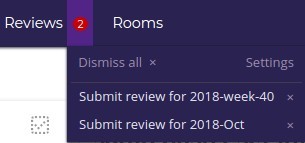
And here’s a demo of all of the different hotkeys/formatting options you can now use:
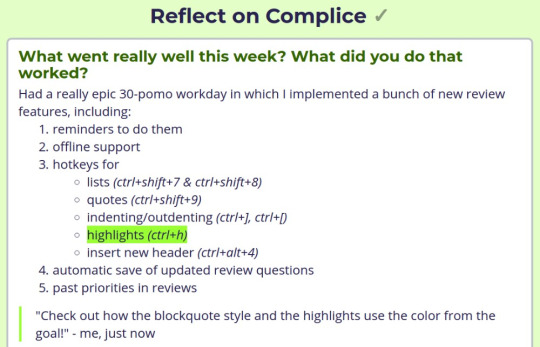
If you modify the review questions, this shows up so you can use the same questions next time:

7 notes
·
View notes
Text
What to do when you have stale reminders
A user writes:
I have been using Complice for a while and I am at a stage where I am reminded to do a few things that I might not have remembered, but I am not excited to craft my things to do.
I think part of the problem is I have a bunch of stuff coming in from Workflowy, which includes little reminders (wear a belt, which I sometimes forget) and (do not eat after 9pm, which I sometimes ignore)
I am just blathering, but if this is a thing that people go through (and has an article written, I would not mind being pointed to it, or) you can just nod and listen
This is a natural cycle. What you're encountering is a form of staleness. Complice is in general designed to combat staleness, for instance by not allowing you to enter a bunch of tasks that you're not actually going to do today. However, staleness can still show up in a few ways. The dailies and notdones features were ones that I knew would introduce sources of staleness into the system, so I did my best to counter-optimize for that. I think I did a reasonably good job, but it's not perfect yet.
The WorkFlowy integration... needs major work. Having established that, there are two levels to it:
What can you do differently? (since you're asking)
What can Complice do differently? (since most Complice users won't read this article)
What can you do differently?
It sounds to me like you want to fix your belt problem using something other than a reminder in your task list. I wrote an article called How to send perfectly-timed physical messages to your future self which would advocate for a strategy something like "when you take your belt off, put it on top of something that you'll pick up tomorrow after you have your pants on" and then obviously when you go to pick up that something, you'll first need to pick up your belt, at which point you put your belt on.
This is a specific example, but the general principle is that doing your desired behavior automatically is better than doing it by reminder. And if you do have to use a reminder, the best kind is one that leaves no ambiguity about whether or not now is the moment. So for "do not eat after 9pm", maybe what you want is something that will make your phone buzz once at 8:30pm, to remind you that it's your last chance to eat today, and something to make your phone buzz at 9pm, indicating that eating is now over for the day—whether you heeded the warning at 8:30 or not!
Another even-more-general principle is: if something isn't working, stop doing it. If the Complice "do not eat after 9pm" intention isn't reminding you to stop eating after 9pm, then find something else. You might still keep the intention around if you want to track which days you were successful at this, but it's clearly failing as a reminder.
Making sense of staleness
While writing this post, I ended up writing so much under dealing with staleness that I decided to make it its own post: Making sense of a single stale task
The basic gist is that it could be because the thing actually doesn't matter, or it could be because you're conflicted about it. If the thing doesn't matter, don't do it! If you're conflicted, either fix the task until you're not conflicted, or find a way to get back in touch with why the task matters so that rather than forcing yourself to do it (and resisting being forced) you're naturally drawn to it based on your sense of purpose.
What can Complice do differently?
Well, one thing would be if Complice could detect when people might be in situations like yours, and encourage them to reflect a bit like this post is doing.
Another piece is that it's currently hard to stop stale WorkFlowy things that are getting pulled into Complice, from within the Complice UI. My workflow for this looks like "copy the node id from my intentions textbox, open up a WorkFlowy tab, replace the node id in that tab with the one from my intentions, then delete/complete/untag that node." Even though that only takes 10-20 seconds, it's still way too cumbersome.
Regarding reflecting when things go stale, Complice could notice when you have an intention N days in a row and it doesn't get done, and prompt you to think about it a bit more. The notdone propagator currently does this with one-off intentions, but there's still a major issue here with repeating tasks either from the built-in dailies or from WorkFlowy.
0 notes
Text
Timer webhooks!
In the same week, a couple of different users messaged me to ask if I would add timer webhooks so that they could automatically have RescueTime turn on & off the Focustime feature (which blocks distracting websites) when the pomodoro timer starts & stops.
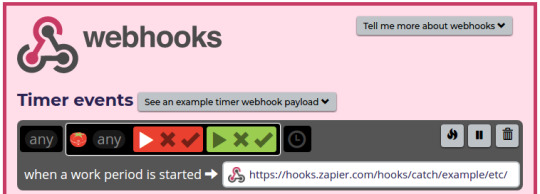
So I did it!
I set it up so that you could do the filtering on your end or on Complice’s end. If you just want to get all of the different events and deal with them, use “any”, or “pomo-any”. Or you can pre-aim different timer events to different places by making multiple hooks. I’m planning to add webhooks for task events as well, based on the beeminder arbitrary-task module, which will be awesome.
Ideas for things you can use this for:
start/stop something like focustime to reduce distractions
maybe integrate with tasker somehow to turn your phone to airplane mode
store all timer-finished events in a spreadsheet so you could track which times of day you're working
notify a slack channel that you're working
change your status on some other site/system
hook up an arduino and make a light outside your room turn red or green based on whether you're working or breaking (I've wanted to do this for years)
(and more! what are your ideas?)
Get started here
0 notes
Text
Making sense of a single stale task
One of the core pieces of the Complice philosophy is to deal with staleness, rather than letting it get mouldy. The term "stale" can be used to refer to a big long list of to-do items that you're probably never going to get to but keep thinking you should, or just one such item.

I wrote an article on 5 Ways to Deal With a Stale Task System. That article is about how to deal with a situation where you have a long list of items and the list as a whole is stale. This is an extremely common situation with a conventional to-do list system, in Todoist, Asana, or any other list app or other GTD system. Probably at any given time, most people have at least one list somewhere of tasks that seemed really important a few months ago but which realistically they're never going to do.
But if you're using a system like Complice that prompts you to recreate your list each day, then you're already doing pretty well on this front. There are, however, still a few ways that things can go stale. Mostly this is going to be from the notdones propagator, the daily intentions system, the top priority feature, or the WorkFlowy integration (or perhaps other integrations that don't exist at the time of writing this).
These sources of staleness are pretty small though, which means that you can look at the item or items individually and ask "what makes sense with this?"
Staleness is a natural part of life: intentions for the future go stale just like food does.
When you notice that some task (or system to cause you to do a single task) from the past has gone lifeless, this can mean a few things:
the thing used to matter, but no longer does
the thing never mattered, and you've been in denial
you've forgotten why the thing matters
some part of you is in conflict about doing the thing
In any case, you want to reflect on this, rather than persisting in this state of staleness and stuckness!
Take a moment to think (in your head, out loud, or in text) about whether the thing matters, and if you feel coherent or conflicted about doing it. Distinguishing between the first two is interesting, but not necessary—the point is, the thing doesn't matter, and so you can ditch it. (And to be clear—it could be "worth doing", but not relative to all of the other actions one could take. Opportunity cost matters.) When something does matter, but we forget, it's often because we're orienting to the words in our list—"do not eat after 9pm"—instead of the referent of those words, ie the actual experience of how you feel when you stick to your desired eating habits. Words don't matter.
...but when it matters...
Of course, sometimes you're acutely in touch with the importance of the thing just by glancing at the words, but also... you don't wanna. Or you always feel like you wanna... tomorra.
(If the task isn’t urgent or absolutely necessary, it can be worth just consciously deciding you aren’t going to bother doing it at the moment, and clearing it from the list of “things I should do”. You’ll bump into it again if it really needs doing!)
In this context, you can think of conflict as falling into two categories: task definition & inner rebel. Task definition conflict means that part of you knows that the way you've defined the task, trying to work on it will be a mistake. I encountered this when I was struggling to get myself to create an email course based on what I know about productivity. I realized that some wise part of me was refusing to work on it because I was on-track to half-ass it, and deep down I knew that (for me) a half-assed email course was worse than no email course. I realized I needed to decide either to make it and make it good, or to stop trying to force myself to do something that was counterproductive.
Other times, it's not about the specific nature of the task. It's about that part of you that absolutely hates being told what to do. The part that will actively resist doing enjoyable things if they feel like obligations. This is the inner rebel. Entire books have and will be written about this, but my brief suggestion is this:
Recognize that your inner rebel isn't your enemy. (In fact, it lends support to the part of you that notices mis-defined tasks too, which protects you from wasting your time!)
Say hi to your inner rebel (this might sound silly but can be surprisingly potent)
In any case, try to shift your focus from the task at hand to the purpose of the task: what difference in the world is that task intended to make? eg. if the task is "clean my room", shift your focus from the act of cleaning to the desired state of your room and how much you would enjoy it, contrasted with the current state of your room.
Another phrase you might try is "I don't need to do this and maybe I don't even want to do this, but if I did want to do this, why would that be? just hypothetically?" Saying this can help circumvent the inner rebel's tendency to reject being told that it should want something.
If the "say hi" thing seems to produce a shift, try asking the inner rebel what it wants. You don't necessarily need to "give it" what it wants, but sometimes it makes a difference just to hear it out. If that doesn't work, or the notion of talking to parts of yourself doesn't make sense for you, you can either ignore this & move on, or read more about it if you're intrigued.
I've written further about the relationship between the inner rebel and inner authoritarian in Building self-trust with Self-Referential Motivation
That's a bunch of philosophical & psychological stuff. If you're looking for a hack, try this: just start. Set a 5 minute timer, or a 25 minute pomodoro, and get started. Regardless of finishing, getting over that initial hurdle can make a huge difference.
Hop in this virtual coworking room for peer support!
1 note
·
View note
Link
There’s a fable of a man stuck in a flood. Convinced that God is going to save him, he says no to a passing canoe, boat, and helicopter that offer to help. He dies, and in heaven asks God why He didn’t save him. God says, “I sent you a canoe, a boat, and a helicopter!”
We all have vivid imaginations. We get a goal in our mind, and picture the path so clearly. Then it’s hard to stop focusing on that vivid image, to see what else could work.
New technologies make old things easier, and new things possible. That’s why you need to re-evaluate your old dreams to see if new means have come along.
0 notes
Text
New little feature: intentions list separator
This has been requested several times before, but for whatever reason I decided that now was the time to actually do it! You can enter a separator like this:
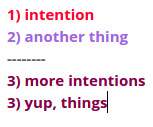
in addition, you can stick a number at the front if the separator is somehow themed to one of your goals, or you can stick some text at the end if you want to say something like "after work". So that would be like:
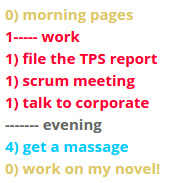
1 note
·
View note
Text
Tips for if you feel unmotivated
If you've got one specific thing you "should" be doing and you're having trouble feeling motivated to do it, here's a few tips:
Instead of trying to do it, just write out some instructions for someone else to do it. Then if you want, you can try following the instructions!
Or just start with step one! what is one little thing to make some progress... can you do that?
Or try to tap into why you want to do the thing. If you can't tap into why you want to do the thing, then just don't do it!
If, by contrast, you're feeling a more general lack of motivation...
Think of something that would feel really fun to do, and do that on purpose!
If nothing feels like it would be fun, well... in that case you've gotten yourself an interesting resource of grumpy-you. Sometimes when I get grumpy-Malcolm on my hands I deploy him to do a random unpleasant task that needs doing eventually, because he's not going to enjoy himself anyway, so he might as well be leveraged towards something useful. What might grumpy-you be useful for?
Make sure that it's not due to vicious rock-paper-scissors: a phenomenon where you actually *do* have something you should do, but because you don't want to do it, you aren't, but you also aren't doing something else instead. You're just... yeah. If it is that, make a conscious choice about what would be really worth doing, and do that!
2 notes
·
View notes
Text
How to re-invigorate your goals
A user, Will, writes:
Hey Malcolm! I'm having a general conundrum that I'm sure you've encountered, and I'm wondering what advice you have as it relates to using Complice.
I've been using Complice for the last year now (and love it, thank you for all your work).
Lately, I'm have been doing a horrible job of tracking anything at all.
I'm still following through on many of my goals, but tracking them with Complice has started to feel like a stale task I have to get done rather than a valuable activity.'
A few explanations I have: I've set too many goals so I'm a bit overwhelmed, the goals themselves are not specific and exciting.
My question to you: how have you dealt with this general feeling of 'staleness' towards goal-tracking? How do you hit the reset button, and reinvigorate yourself?
Great question Will!
As much as Complice is designed to avoid staleness, the app can't do anything about the fact that priorities do shift and change over time.
I think your general ideas are probably pretty good, so I'm going to build on them.
"too many goals"
If you have too many goals, and you're trying to do something towards every goal every day, then you're going to either end up...
Regularly failing to do anything (some of) your goals, and feeling bad.
Doing some little thing towards (some of) your goals each day, and marking that as "enough" for the day "because, I mean, it's not like I had more time to work on that goal, so it has to be enough, right?"
Working really hard, not sleeping, and burning out. And then feeling bad.
None of these is a fun situation to be in. But, having identified these, we can use them as diagnostics for answering the question "do I have too many goals?"
If you're genuinely spending a lot of your time in a goal-oriented way, but one of the above things is happening to you, then probably you have too many goals. Or perhaps your goals are too ambitious, but particularly in Case #2, this is a sign that you've spread yourself a bit thin, and you're not able to actively care for all of these different things at once.
Take a moment and let in the reality of that, if it's true.
Okay, now what? Well, now you can stop pretending that you're going to be able to do 30 hours of stuff in a 24 hour day, and you can prioritize what you actually want to make happen. You might realize that one of the responsibilities you have isn't actually that valuable, and scale back your involvement. You might merge two related goals together. You might decide to demote your Fitness goal to just being a daily habit:
(&) do 10 pushups and 10 sittups before breakfast
It's not gonna get you totally in shape, but it's better than nothing and it's much better than nothing-but-I-feel-bad-about-it.
"not specific"
If your goals aren't specific enough, make them more specific. My general heuristic is that you don't necessarily need a concrete or quantified definition of what completeness will look like, but it's worth at least having a description that can let you say:
Have I achieved this goal?
Am I getting closer?
In setting more concrete targets, you want to be wary of feeling bad for not already having achieved them, and also wary of feeling bad for not achieving them as fast as you hoped you would. You're probably still doing better than you would be if you didn't have the target, so having the target isn't a reason to feel bad.
On the other hand, if your goals are already specific, but your actions aren't specific, then it's time to do something thinking, asking, or research about what sorts of actions you'll actually need to take to achieve your goals. One of my favorite hacks for this is to try to find 1-3 people who've done something similar before and ask them what they'd recommend. Maybe even find someone who tried and failed and see what they know about it.
If nobody has done this before, or you don't know anybody who has, then you're a bit more on your own, but you can still generate a best plan of approach, and then set out to follow it, updating it as you go.
"not exciting"
Above I included the conditional "if you're genuinely spending a lot of your time in a goal-oriented way". What if you're not? Probably, it's because you aren't tapped in with why your goals are awesome.
Did those goals excite you when you first laid them out?
If yes, consider: did you learn something such that you're not excited anymore? Or did you just get distracted from the aspect of the goal that was motivating you in the first place?
If you're no longer excited because you realized that the goal isn't a good fit for you, then this is actually very exciting news! It means you can stop feeling bad about not doing it, and find something better to do instead.
On the contrary, if you still feel really excited about the goal when you feel into it, but you just... forget to... then probably the thing to do is to find some ways to get yourself back in touch with the excitement, more consistently.
This could be things like
Change the name of the goal. I once had a fitness goal called "Tiger" because I really liked the aesthetic of the lithe power, beauty, and grace. It was much more motivating than "get in shape" or just "fitness" would have been for me.
Find a friend with similar interests who you can talk to about your goal regularly to get back in touch with the energy of what you want to achieve.
Do some writing first thing in the morning or first thing after work about what you're hoping to achieve.
Close your eyes and feel into how awesome it will be to achieve your goal: to finally be a published author or debt-free or graduated or a entrepreneur, or whatever it is. Make sure to also reflect on the obstacles that stand in your way. More on this technique here.
Each time you go to submit intentions, or to start working, look at the names of your goals, and take a moment to remind yourself: why am I doing this?
You don't need to do all of these, just pick one or two that work well for you and your situation.
...some combination of complex factors
Sometimes you need to refactor your goals. They used to represent your sense of the most direct vectors along which you could move towards the world you want to live in, but now they're feeling blocked or frictiony. That happens!
When it does, it might be time to look at the various actions that are feeling important to you that you're doing, and also to consider actions that feel like they might be important that you're not doing, and to write them all out, then try to find a new way to dimensionalize the space of what you're trying to achieve. Maybe "reading" and "writing" get combined under "information diet", while your "content production" goal turns into a more specific "start a podcast" goal.
Or you could start over. Instead of trying to fix your existing goals, become a new homunculus: imagine that you're an alien who just woke up in your body, your life, etc, and with your values. What would it make sense to do in the current position? Try thinking about this while thinking minimally about your existing to-do list for the day or week, and consider "what do I really want to be moving towards? what goals would feel really exciting to pursue?"
Once you've found your excitement, then you can excitedly figure out how to get there from here.
I think that this post contains good advice, but the most important piece of all is this: actually take the time to think about it. Knowing all of this advice is no good if you don't actually spend time improving your goal architecture. And even without this advice, I bet most people could do a reasonably good job of figuring out what they need to do with their goals, as long as they actually do something at all.
If you're feeling inspired to think about this, sign up or log back into your Complice account, and we'll help walk you through it!
Also, a secret feature! You can access a goal-setting guide by going to complice.co/YOUR-USERNAME/goals/wizard. It shows up automatically for your first goal, but you might find it helpful for other goals as well. The disadvantage is that you can't see all of your goals at once, which means it's easy to overcommit.
0 notes